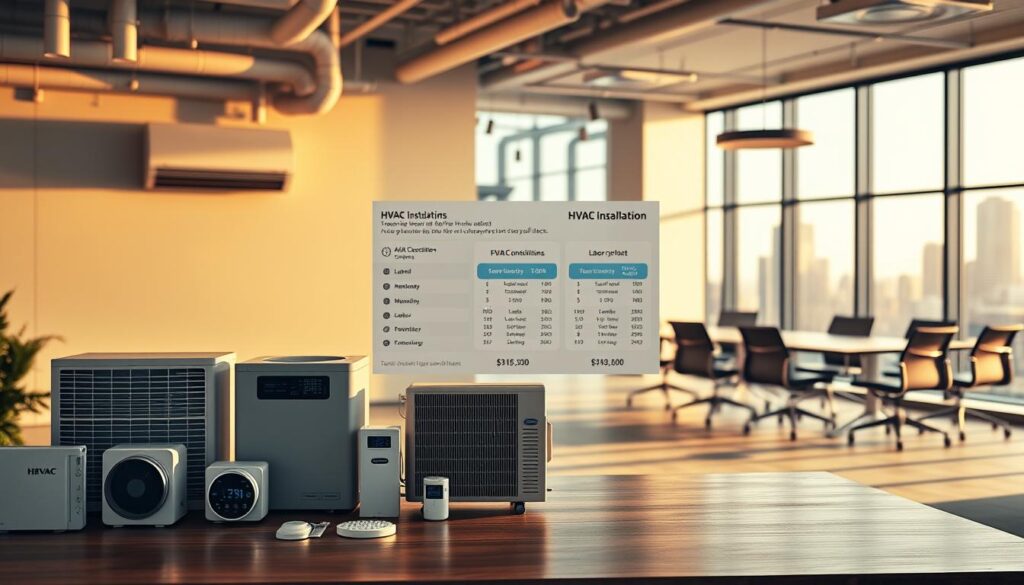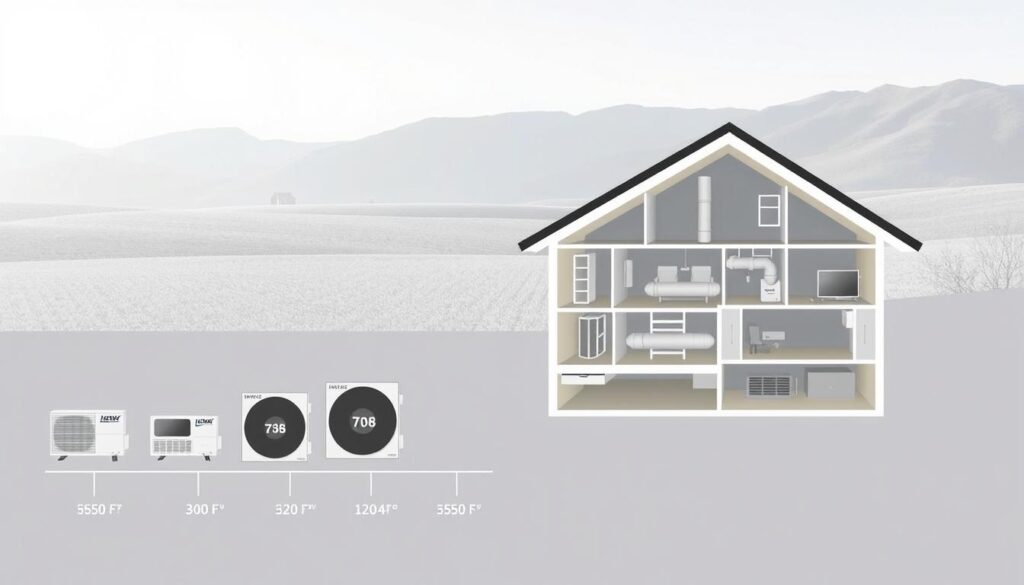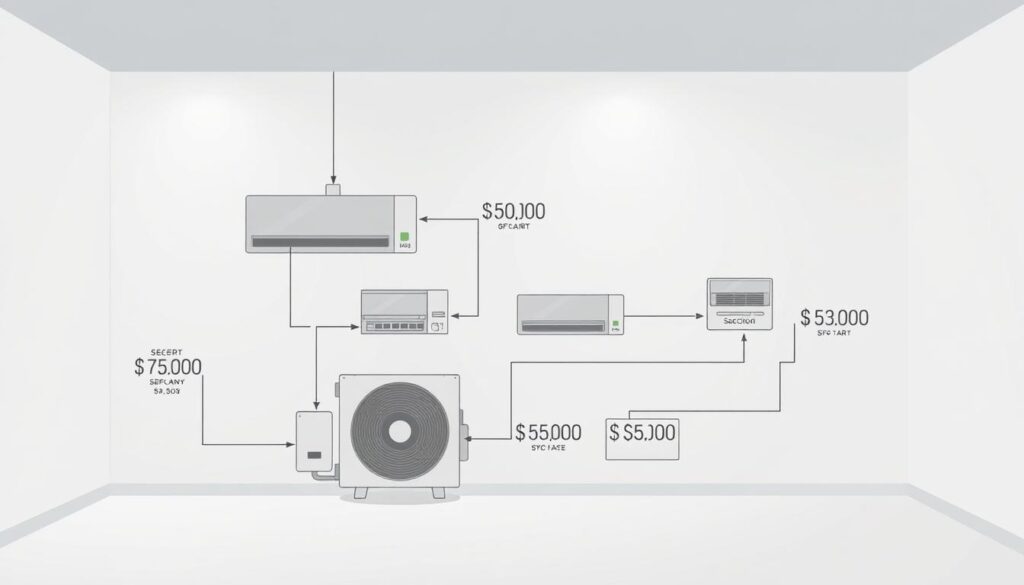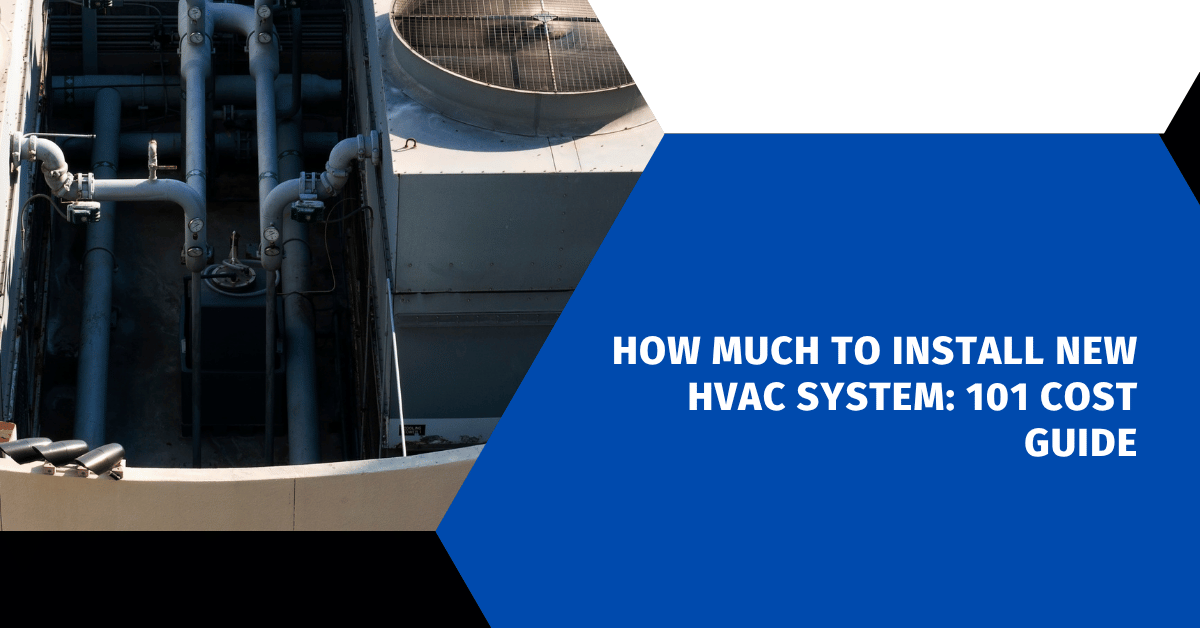Affiliate Disclosure
HVAC Guide Guys is a participant in the Amazon Services LLC Associates Program, an affiliate advertising program designed to provide a means for sites to earn advertising fees by advertising and linking to Amazon.
How Much to Install New HVAC System? Are you curious about the cost of a new HVAC system for your home? Figuring out the hvac installation cost can seem overwhelming. It’s like trying to find your way through a maze of prices and choices.

Getting a new HVAC system is a big deal for homeowners. The cost to install one usually falls between $5,000 and $12,500. This price varies based on your home’s size, the type of system you choose, and local rules.
This guide will help you understand the cost of installing a new HVAC system. We’ll cover everything you need to know. This way, you can make a choice that fits your comfort, efficiency, and budget needs.
Key Takeaways
- Average HVAC installation costs range from $5,000 to $12,500
- Total price depends on home size, system type, and complexity
- Energy efficiency can impact long-term cost savings
- Professional installation is key for the best system performance
- There are many financing options for HVAC investments
Table of Contents
Understanding HVAC System Basics
Before you look into replacing your HVAC system, it’s important to know the basics. HVAC systems are key to keeping your home comfortable and the air clean.
An HVAC system has several important parts. These parts work together to control temperature, humidity, and air flow in your home.
Core Components of HVAC Systems
- Thermostat: The control center that manages temperature settings
- Furnace: Provides heating during cold months
- Air Conditioning Unit: Cools and dehumidifies the air
- Ductwork: Distributes heated or cooled air throughout the home
- Air Filters: Remove dust, allergens, and particles from circulating air
Types of HVAC Units
The cost of a new HVAC unit depends on the type you choose. Here are the most common types:
| HVAC Unit Type | Best For | Typical Application |
|---|---|---|
| Central Air Conditioning | Entire Home Cooling | Large Residential Spaces |
| Heat Pump | Heating and Cooling | Moderate Climate Regions |
| Ductless Mini-Split | Targeted Area Conditioning | Homes Without Ductwork |
HVAC System Lifespan
Knowing how long an HVAC system lasts is key for planning. Most residential HVAC systems last between 10 to 15 years. With regular care, they might last even longer.
Keeping your system well-maintained can help it last longer. This means fewer repairs and less need for a new system, saving you money.
Average HVAC Installation Costs
When you’re thinking about upgrading your HVAC, knowing the typical cost is key. The price for a new HVAC system can change a lot. This depends on a few important things.
For a typical home, expect to pay between $10,000 and $15,000 for a new system. This price includes all the main parts and the cost of a pro to install it.
- Standard efficiency systems: $10,000 – $15,000
- High-efficiency systems: $15,000 – $20,000
- Complex installations: Up to $25,000
Your exact cost will depend on a few big factors:
- How big your home is
- How complex the system is
- What local labor costs are
- The brand and efficiency of the equipment
Pro tip: Always get multiple quotes to ensure you’re getting a competitive price for your HVAC installation.
Investing in a quality HVAC system can save you money on energy bills in the long run.
Explore Our HVAC Shop
Looking for top-rated HVAC tools, parts, and accessories? Visit our shop and find the perfect solution for your needs.
Visit the ShopHow Much to Install New HVAC System by Type
When you plan to get a new HVAC system, knowing the cost differences is key. The price to install a new HVAC system changes a lot based on the type you pick.
Let’s look at the costs for different HVAC systems to help you plan your budget:
Central Air Conditioning Systems
Installing a new central air system costs between $3,500 and $8,500. The price depends on a few things:
- Home size and square footage
- Unit efficiency rating
- Complexity of installation
- Local labor rates
Heat Pump Installation
Heat pumps are great for both heating and cooling. Installing a heat pump costs between $4,000 and $10,000. They work best in moderate climates.
Furnace Installation
For furnaces, expect to spend $3,000 to $6,500 for a full install. Gas furnaces are pricier but heat more evenly.
Pro Tip: Always get multiple quotes and consider long-term energy efficiency when choosing your HVAC system.
Home Size and HVAC Cost Correlation

Your home’s size is key in figuring out the cost of HVAC installation. HVAC experts look at your home’s square footage. They then suggest the best and most cost-effective AC unit for you.
Every home size needs a specific HVAC system size. Experts use British Thermal Units (BTUs) to find the perfect system for your home.
- Small homes (under 1,000 sq ft): Typically need 18,000-24,000 BTU systems
- Medium homes (1,000-1,500 sq ft): Require 24,000-36,000 BTU systems
- Large homes (1,500-2,500 sq ft): Need 36,000-48,000 BTU systems
- Extra-large homes (2,500+ sq ft): May require multiple HVAC units
Choosing the wrong size can cause cooling problems, higher energy bills, and damage to your system. Getting the right size ensures your system works well and lasts longer.
| Home Size | Estimated BTU Requirement | Average HVAC Installation Cost |
|---|---|---|
| 1,000 sq ft | 24,000 BTU | $3,500 – $5,000 |
| 1,500 sq ft | 36,000 BTU | $5,000 – $7,500 |
| 2,500 sq ft | 48,000 BTU | $7,500 – $10,000 |
Choosing the right HVAC system size is important. A qualified HVAC expert can help you find the best system. This ensures your home is cool and you manage your HVAC costs well.
Explore Our HVAC Shop
Looking for top-rated HVAC tools, parts, and accessories? Visit our shop and find the perfect solution for your needs.
Visit the ShopHVAC Brands and Their Cost Ranges
When looking at a new HVAC unit price, knowing the different brands is key. The cost to replace an HVAC system changes a lot based on the brand. Each brand has its own features and prices, fitting various budgets and needs.
Premium Brands: Top-Tier Performance
Premium brands like Carrier and Trane are at the top of HVAC tech. They offer:
- Highest efficiency ratings
- Advanced technological features
- Extended warranty options
Prices for these premium brands start at $3,000 and go up to $15,600. This shows their high quality and advanced engineering.
Mid-Range Options: Balanced Performance
Bryant and Lennox are great for those wanting reliable performance without spending too much. These brands offer:
- Solid reliability
- Moderate efficiency levels
- Prices between $3,100 and $10,000
Budget-Friendly Choices: Affordable Comfort
Amana and Goodman are good for those watching their budget. They provide:
- Affordable prices for new HVAC units
- Basic but dependable performance
- Prices from $3,600 to $11,000
Your choice should match your budget, home size, and needs. Think about the long-term value and the initial cost when deciding.
Additional Installation Expenses

When you’re planning to get a new HVAC system, remember it’s not just the unit’s cost. There are other important expenses that can add up. These can change how much you’ll spend in total.
Ductwork changes are a big part of these extra costs. Your home’s layout might mean you need to:
- Seal existing ductwork
- Replace damaged sections
- Install new duct runs
- Upgrade duct insulation
The cost of ductwork can be high. Experts say it could be around $5,000. Electrical work is also key, mainly for older homes. These might need new panels or circuits.
Structural changes can also raise your costs. Some jobs might require:
- Reinforcing attic or basement spaces
- Creating new ventilation openings
- Removing existing infrastructure
Tip: Always ask for a detailed quote from your HVAC contractor. This way, you won’t face unexpected costs during your project.
Explore Our HVAC Shop
Looking for top-rated HVAC tools, parts, and accessories? Visit our shop and find the perfect solution for your needs.
Visit the ShopEnergy Efficiency and Cost Savings
When you think about getting a new AC unit, saving money is key. ENERGY STAR-certified HVAC systems cost more upfront. But, they save you a lot of money in the long run.
Knowing about SEER ratings is important. A higher SEER means your system uses less energy. This means lower bills for you.
- ENERGY STAR units can reduce cooling costs by up to 15%
- Federal tax credits offset hvac upgrade cost for efficient systems
- Modern units consume significantly less electricity
“Investing in an energy-efficient HVAC system is like putting money back in your pocket every month.” – Energy Efficiency Expert
There are more benefits than just saving on energy. Many utility companies give rebates for efficient systems. This can cut down your costs even more.
At first, the cost of upgrading your HVAC might seem high. But, the savings over time are huge. A high-efficiency system can save you thousands, making it a smart choice.
HVAC Installation Cost Factors
When planning an HVAC installation, it’s important to know the different cost factors. Your HVAC installation cost isn’t just about the equipment. Many other elements also play a role in the final price.
Several key variables can significantly impact your hvac contractor rates and overall project expenses:
- Geographic location plays a big role in pricing
- Seasonal timing affects installation costs
- Project complexity determines labor expenses
Geographic Location Dynamics
Your home’s location greatly affects HVAC installation costs. Areas with extreme climates or higher living costs tend to have higher prices. Urban areas usually have higher hvac contractor rates than rural areas.
“Location can shift installation costs by up to 30% depending on regional market conditions.”
Seasonal Timing Considerations
When you schedule your HVAC installation is important. Peak seasons like summer and winter can make prices go up because of high demand. Choosing off-peak months can lower your hvac installation cost by 10-15%.
Installation Complexity Factors
The complexity of your installation also affects pricing. Challenges like:
- Unique home architectural design
- Ductwork modifications
- Electrical system upgrades
Each complexity factor can increase your total installation expenses.
Project Difficulty and Price Variations
When you plan to replace your HVAC system, you’ll find that costs vary. The complexity of your project greatly affects the cost. Some installations can be much more expensive than others.
Several factors can make your HVAC installation more difficult and costly:
- Home Age and Structure: Older homes often need big changes to fit new HVAC systems
- Hard-to-reach spots like tight attics or crawl spaces
- Unique designs that make ductwork tricky
- Needs for electrical or structural changes
Challenging installations can really up the cost. For example, homes with unusual layouts or big ductwork changes might cost 20-50% more than simple replacements.
Your home’s features will decide how complex and expensive the installation will be. HVAC experts can give you a clear idea of what to expect before starting your project.
Pro Tip: Always get multiple quotes and detailed assessments to understand your specific installation challenges.
If you’re watching your budget, set aside 10-15% extra for unexpected costs.
Explore Our HVAC Shop
Looking for top-rated HVAC tools, parts, and accessories? Visit our shop and find the perfect solution for your needs.
Visit the ShopFinancing Options for HVAC Installation
Getting a new HVAC system can cost a lot for homeowners. Knowing your financing options can help you manage the cost better. There are many ways to make paying for your new HVAC system easier.
- Home Equity Loans
- HVAC Company Financing
- Personal Loans
Home Equity Loans: Leveraging Your Property’s Value
Home equity loans have good interest rates for homeowners. You can use your home’s equity to pay for HVAC costs. These loans usually have lower interest rates than other options.
HVAC Company Financing: Direct Solution
Many HVAC companies and manufacturers offer their own financing. These plans often include:
- Flexible payment plans
- Low introductory rates
- Quick approval processes
Personal Loans: Flexible Funding
Personal loans from banks or online lenders can help with HVAC costs. They offer fast funding and easy application processes.
“Choosing the right financing option can make your HVAC investment more manageable and stress-free.” – HVAC Financial Experts
| Financing Option | Interest Rates | Approval Speed |
|---|---|---|
| Home Equity Loans | 3-8% | 2-4 weeks |
| HVAC Company Financing | 0-9% | 1-3 days |
| Personal Loans | 6-36% | 1-7 days |
Tip: Always compare multiple financing options to find the best terms for your specific financial situation.
Conclusion
When thinking about installing a new HVAC system, look at more than just the cost. Your home’s needs, energy goals, and budget are key. Knowing the cost of HVAC installation helps you choose wisely, balancing short-term costs with long-term benefits.
Prices for HVAC systems vary by region. In places like North Carolina, costs range from $5,000 to $12,000. These prices change based on your home’s size, the system you choose, and how complex the installation is. Getting quotes from certified contractors helps you find the best price and advice for your home.
Planning can help you save on HVAC installation costs. Look into financing, install during off-peak times, and choose energy-efficient models. Even though top brands like Carrier or Trane might cost more upfront, they save money in the long run by using less energy and needing fewer repairs.
Your main goal is to find an HVAC system that’s comfortable, energy-smart, and good value. Do your research, compare options, and talk to HVAC experts. This way, you’ll find a system that fits your home’s needs and your budget.
FAQ
What is the average cost to install a new HVAC system?
How long does a typical HVAC system last?
What factors affect HVAC installation costs?
How do I choose the right HVAC system size for my home?
Are there financing options available for HVAC installation?
What are the benefits of choosing a high-efficiency HVAC system?
How much does it cost to replace ductwork during HVAC installation?
What is the average cost to install a new HVAC system?
How long does a typical HVAC system last?
What factors affect HVAC installation costs?
How do I choose the right HVAC system size for my home?
Are there financing options available for HVAC installation?
What are the benefits of choosing a high-efficiency HVAC system?
How much does it cost to replace ductwork during HVAC installation?
FAQ
What is the average cost to install a new HVAC system?
Installing a new HVAC system costs between ,000 and ,000. This depends on your home’s size, the type of system, and the brand. Central air systems cost between ,500 and ,500. Heat pumps range from ,000 to ,000.
How long does a typical HVAC system last?
HVAC systems usually last 10 to 15 years. Regular maintenance can extend their life. But, usage, maintenance, and climate also play a role.
What factors affect HVAC installation costs?
Several factors affect costs. These include your home’s size, the system type, and energy efficiency. Brand, location, and the time of year also matter. Additional costs for ductwork or electrical upgrades can add up.
How do I choose the right HVAC system size for my home?
HVAC experts consider your home’s size, insulation, and climate. They also look at the number of windows. Choosing the right size ensures efficiency and comfort.
Are there financing options available for HVAC installation?
Yes, there are financing options. You can use home equity loans or personal loans. Some contractors offer payment plans to help with costs.
What are the benefits of choosing a high-efficiency HVAC system?
High-efficiency systems save on energy bills. They cost more upfront but save money over time. You might also get tax credits or rebates.
How much does it cost to replace ductwork during HVAC installation?
Replacing ductwork costs between
FAQ
What is the average cost to install a new HVAC system?
Installing a new HVAC system costs between $5,000 and $12,000. This depends on your home’s size, the type of system, and the brand. Central air systems cost between $3,500 and $8,500. Heat pumps range from $4,000 to $10,000.
How long does a typical HVAC system last?
HVAC systems usually last 10 to 15 years. Regular maintenance can extend their life. But, usage, maintenance, and climate also play a role.
What factors affect HVAC installation costs?
Several factors affect costs. These include your home’s size, the system type, and energy efficiency. Brand, location, and the time of year also matter. Additional costs for ductwork or electrical upgrades can add up.
How do I choose the right HVAC system size for my home?
HVAC experts consider your home’s size, insulation, and climate. They also look at the number of windows. Choosing the right size ensures efficiency and comfort.
Are there financing options available for HVAC installation?
Yes, there are financing options. You can use home equity loans or personal loans. Some contractors offer payment plans to help with costs.
What are the benefits of choosing a high-efficiency HVAC system?
High-efficiency systems save on energy bills. They cost more upfront but save money over time. You might also get tax credits or rebates.
How much does it cost to replace ductwork during HVAC installation?
Replacing ductwork costs between $1,500 and $5,000. It depends on your home’s size and the installation complexity. The cost varies based on accessibility and material quality.
What is the most cost-effective HVAC system type?
Furnaces are often the most cost-effective, costing between $3,000 and $6,500. But, the best choice for you depends on your climate, energy prices, and heating and cooling needs.
How can I reduce HVAC installation costs?
To save, get quotes from different contractors. Install during off-peak seasons. Choose a mid-range efficiency system. Make sure your home is well-insulated. Some utilities offer rebates for energy-efficient systems.
Do I need to replace both indoor and outdoor HVAC units?
It’s usually best to replace both units at once. This ensures efficiency and compatibility. Mismatched units can lead to poor performance and system failures.
,500 and ,000. It depends on your home’s size and the installation complexity. The cost varies based on accessibility and material quality.
What is the most cost-effective HVAC system type?
Furnaces are often the most cost-effective, costing between ,000 and ,500. But, the best choice for you depends on your climate, energy prices, and heating and cooling needs.
How can I reduce HVAC installation costs?
To save, get quotes from different contractors. Install during off-peak seasons. Choose a mid-range efficiency system. Make sure your home is well-insulated. Some utilities offer rebates for energy-efficient systems.
Do I need to replace both indoor and outdoor HVAC units?
It’s usually best to replace both units at once. This ensures efficiency and compatibility. Mismatched units can lead to poor performance and system failures.

